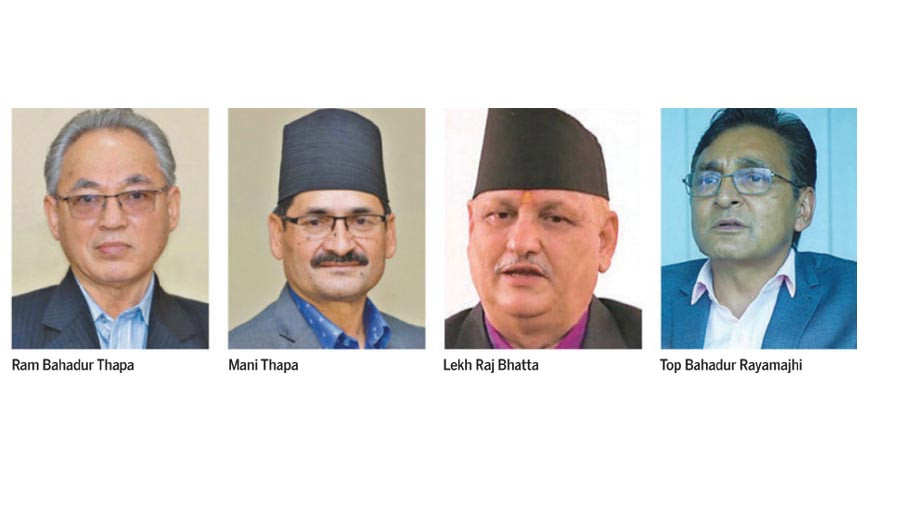Politics
Mani Thapa’s exit puts spotlight on the fate of ex-Maoists in UML
A leader says former Maoists who joined the UML were given importance at the time of NCP split but were gradually sidelined.
Purushottam Poudel
When the Supreme Court’s verdict in March 2021 dissolved the then Nepal Communist Party (NCP) and revived the CPN-UML and CPN (Maoist Centre), most of the leaders returned to their mother parties.
A group of Maoist leaders, however, joined the UML. They included some key Maoist leaders such as Ram Bahadur Thapa, Top Bahadur Rayamajhi, Lekh Raj Bhatta, Prabhu Sah and Mani Thapa. Some central committee members and scores of other cadres from various lower committees followed them to join the UML, the bigger communist party among the two.
The UML and the Maoist Centre jointly fought the general elections in 2017 and later merged to form the NCP in 2018. But the merger was challenged in court, accusing them of copying the name of a fringe communist party. The Supreme Court in 2021 invalidated the merger, reviving their original parties.
While around 30 central level Maoist leaders had joined UML, only a few have succeeded to hold important positions in the UML.
CPN-UML chair KP Sharma Oli on Thursday convened the party’s central secretariat meeting to divide work among the leaders as several of them have become ministers in federal and provincial governments. The same meeting relieved former Maoist leader Mani Thapa of all his positions and roles from the party citing his failure to fulfill the roles and responsibilities assigned by the organisation.
Thapa, who was a standing committee member in the UML, however, had reportedly tendered his resignation around a year ago expressing his differences on various issues with the UML leadership.
Former key maoist leaders Ram Bahadur Thapa and Lekh Raj Bhatta are now vice-chair and secretary in the UML, respectively. Former Maoist leader Top Bahadur Rayamajhi, who was elected UML secretary in 2022, is now suspended after he is accused in Bhutanese refugee scam. He is now in judicial custody as the case is sub-judice.
Prabhu Sah, a prominent Maoist leader of Madhesh Province, quit the UML to form the Aam Janata Party.
Lil Bahadur Thapa and Jwala Kumari Sah are politburo members in the UML.
According to multiple UML leaders with Maoist background, Mani Thapa remained inactive in the party activities and he also remained inactive during the November 2022 election.
A Maoist-turned-UML leader said that the former Maoist Centre leaders, who were given more importance at the time of NCP split and immediately after joining the UML, were gradually sidelined. “That was one of the reasons why Mani Thapa became inactive in party activities,” the leader told the Post requesting anonymity.
At the time of the NCP split, UML chair Oli was in serious trouble as the then UML leaders Madhav Kumar Nepal, Jhalanath Khanal, backed by a powerful group of second-rung leaders, had challenged him in the party. At the time, Oli managed to stay in the leadership taking support of the former Maoist leaders.
“Thapa was a standing committee member in the UML. I am not aware of what exactly he had expected in the party but he was unhappy,” another UML leader with Maoist background told the Post. “It was Thapa’s personal decision to stay away from party activities. It has nothing to do with the party’s work style.”
The Post’s attempts to contact Thapa were unsuccessful.
Among the leaders who left the Maoist Centre to join the UML, Ram Bahadur Thapa, Rayamajhi, and Bhatta had played crucial roles in leading the decade-long Maoist insurgency.
Some UML leaders with Maoist backgrounds admitted that they get discouraged when the party leadership does not acknowledge the people’s war. At times, UML leaders including chair Oli express critical views against Maoists and their decade-long insurgency.
“It is true that UML leadership, especially chair KP Sharma Oli, ruthlessly criticises people’s war, but it is also the fact that both the parties signed a 12-point agreement and agreed to work together for the betterment of the country in 2006,” a former Maoist, currently with the UML, told the Post.
The leader said that UML is the suitable option for communists in the country as the Maoist Centre’s political prospects have drastically diminished in recent years. “Though some of their statements on the Maoist insurgency at times cause bitterness, UML is the safest place for us now,” he added.
Niru Darlami, another Maoist-turned-UML leader, rubbished the claims that former Maoists were deprived of opportunities in the UML. Some Maoist leaders got a chance to become ministers after joining the UML, says a UML leader.
Mani Thapa himself was never given a ministerial position as a Maoist Centre leader but soon after joining the UML, he got the opportunity to lead the Ministry of Water Supply under the KP Sharma Oli government.
Similarly, Jwala Kumari Sah held ministerial berths more than three times after joining the UML.
Giridharilal Naupane, another UML leader with Maoist background, claimed that the leaders’ former Maoist background was no longer an issue in the UML. “We former Maoist leaders have already been mixed in the UML like sugar in water,” he said. “If some former Maoist leader raises the question to UML, it is due to their misunderstanding.”
Meanwhile, some leaders argue that the UML leadership didn’t support Rayamajhi when he got in trouble after being accused in the refugee scam. The party leader still considered Rayamajhi an outsider, they say.
“If any UML leader other than Rayamajhi was indicted in the refugee scam, the UML would have made a lot of efforts to release him from custody,” a Maoist-turned-UML leader told the Post on condition of anonymity.
However, Maoist-turned-UML leader Tanka Angbuhang, who claims to have met Rayamajhi recently in jail, claims that Rayamajhi himself does not feel the party has alienated him.
“During our meeting, Rayamajhi did not show any displeasure to the party,” Aangbuhang told the Post.




 13.12°C Kathmandu
13.12°C Kathmandu














